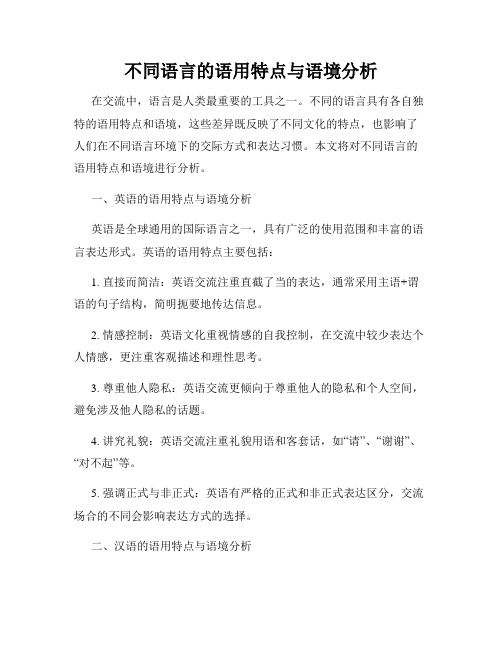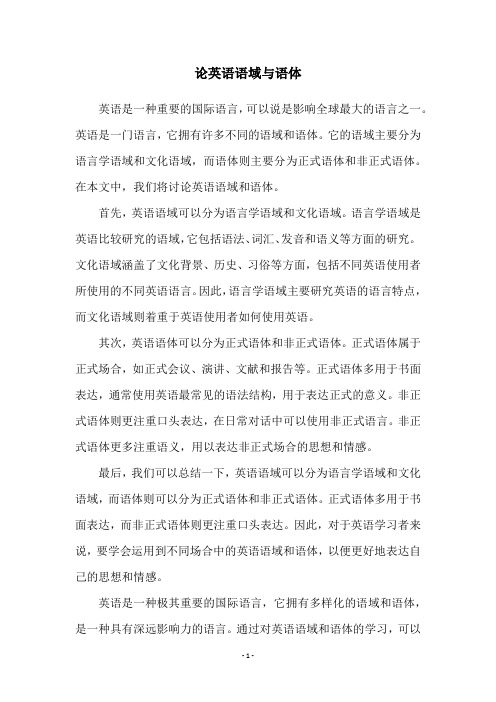正式和非正式英语的一些表达形式
英语写作中正式和非正式文体的语言

简论商务英语写作中正式和非正式文体的语言差异,关键词:商务英语写作正式非正式语言差异中国论文职称论文摘要:商务英语写作是商务活动的重要媒体之一,形式和语体多种多样。
由于公司间贸易关系的亲疏程度不同等因素,商务英语写作可以分成正式和非正式两大类,它们的区别主要从语言上体现出来,本文主要就这方面进行一定的比较和分析。
关键词:商务英语写作正式非正式语言差异Language V ariations in Formal and Informal Business English WritingAbstract:In business activity, correspondence is one of the important media, which has many forms andstyles. Due to such factors as the different relations between businesses, all the writings can be divided intotwo categories, formal and informal. The variations of these two mainly lie in language. This paper is acomparison and analysis in this respect.Keywords: business English writing, formal, informal, language variation一、概述在英语中,“商务”即“business”,它的内涵是多维的。
贸易、旅游、购物、参观、会议、办公等等,只要涉及“business”的,都被认为是商务活动。
商务英语写作作为商务活动的重要媒体之一,承担着不可或缺的作用。
无论是传统的面对面的商务往来还是现代化的网上交易,都缺少不了商务英语写作。
英语邮件问候语

英语邮件问候语在现代社会中,电子邮件已成为人们日常交流的重要方式之一。
随着全球化的发展,越来越多的人开始用英语发送邮件。
然而,有时我们会困惑于如何在英语邮件中正确使用合适的问候语。
本文将为您介绍一些常用的英语邮件问候语,以帮助您在商务或日常邮件中表达尊敬和友好。
第一部分:正式问候语在正式场合,我们通常使用一些比较正式和客套的表达方式。
下面是一些常用的正式英语邮件问候语:1. Dear [姓名],此问候语适用于您非常熟悉的收件人,且希望将邮件写得更正式。
2. Dear Mr./Ms./Dr. [姓],如果您知道收件人的性别和姓氏,这是一种更正式的称呼方式。
3. To Whom It May Concern,当您不知道收件人姓名时,可以使用这个表达方式,适用于正式场合。
第二部分:半正式问候语在一些半正式场合,我们可以使用一些比较友善但不过于随意的表达方式。
下面是一些常见的半正式英语邮件问候语:1. Hi [姓名],这是一种常见的非正式问候方式,适用于您与收件人有一定熟悉度的情况。
2. Hello [姓名],这是一种比较友好而又不失礼貌的问候方式,适用于与收件人有一定关系的情况。
3. Good morning/afternoon/evening,如果您不确定对方在何时会看到邮件,可以使用这种基于时间的问候方式。
第三部分:非正式问候语在与朋友、家人或非商务联系的邮件中,可以更自由地使用一些非正式问候语。
下面是一些常用的非正式英语邮件问候语:1. Hey [姓名],这是一种非常亲切的问候方式,适用于您与收件人有非常密切关系的情况。
2. Hi there,这是一种非常随和和友善的问候方式,适用于与朋友或非正式联系的收件人。
3. What's up,这是一种非常非正式的问候方式,适用于您与收件人有非常亲密的关系。
总结:在英语邮件中,正确使用合适的问候语非常重要。
根据与收件人的关系和邮件的正式程度,我们可以选择不同的问候方式。
could you please 的用法

Could you please 的用法1. 介绍“Could you please”是英语中常用的一种客气用语,用于向他人提出请求或询问。
它可以用于正式或非正式场合,并且在口语和书面语中都很常见。
本文将详细介绍”Could you please”的用法及其相关注意事项。
2. “Could you please”的基本结构“Could you please”的基本结构如下:Could you please + 动词原形 + 其他要求或说明其中,“could”是情态动词,表示一种礼貌的请求或询问。
后面紧跟着的是助动词”you”和动词原形,表示具体要求或行为。
最后,可以添加其他要求或说明,以使请求更加明确。
3. 请求示例下面是一些使用”Could you please”进行请求的示例: - Could you please pass me the salt? - Could you please close the door? - Could you please help me with my homework?在这些示例中,第一个句子是请求别人递给你盐;第二个句子是请求别人关门;第三个句子是请求别人帮助你做作业。
4. 更礼貌的表达方式如果想要更加礼貌地表达请求,可以使用以下形式: - Could you possibly + 动词原形 + 其他要求或说明 - Could I possibly + 动词原形 + 其他要求或说明这种形式中,使用了”possibly”来加强礼貌程度。
下面是一些示例: - Could you possibly lend me a hand? - Could I possibly have a moment of your time?在这些示例中,第一个句子是请求别人帮助;第二个句子是请求别人稍等片刻。
5. 回答方式当有人向你使用”Could you please”进行请求时,可以用以下方式回答: - Sure, I’d be happy to. - Of course, no problem. - Certainly, I can do that.这些回答表达了愿意帮助的意思,并且给予了积极的回应。
书面英语与口头英语区别浅析

句子结构—关系代词
1) 定语从句中作宾语的关系词whom比who正式。 He is the person whom (who) I met the other day.
2) 在定语从句中作主语和宾语的关系词`who, whom, which比that正式。 He is the person who (that) is well-known all over the country. This is the book which (that) I bought yesterday. I know the person whom (that) you spoke to.
书面英语与口头英语
区别浅析
书面英语
• 正式英语(Formal English ) 是比较严谨、庄重的语体。 • 特点是在词汇、句子、语音方面都必须严格遵守民族标准语言的规范。
它所表达的是作者与读者之间的一种非个人的关系, 它力求不借助其它 非语言表达方式如面部表情、手势等来准确地表达思想它通常直接论 述主题, 句子长度不限。主语常以第三人称的形式出现。 • 正式英语可分为公文、政论、科技三种主要的书面语体。
用词比较
非正式使用动词短语
非正式: 1. 2.短语动词: pick up, give up, go on with, fall out, look into
正式使用单个单词
正式: 1.词汇: explode, reduce, position, fatigued
2) 用于请求时,would和could比 will和 can正式。 Would / Could ( Will / Can) you like to give a speech?
泛指时定冠词比名词复数正式 。
正式文体与非正式文体的若干差别2003

正式文体与非正式文体的若干差别缩写词,如don’t, mustn’t, he’s, I’ve 等,一般用于非正式文体。
在正式文体中则把它们写全。
泛指的不定代词you常用于非正式文体中,在正式文体中则用?You never know what new measures the president will take.One never knows what new measures the president will take.在非正式文体中,who可以代替whom在疑问句中用作宾语。
在非正式文体中,宾语从句前的that常省去,尤其在表示“说”和“想”的动词后面:She said (that) she would come.在非正式文体中,they 可以指代everyone, everybody, someone, no one等。
Has everyone finished doing their exercises?Has everyone finished doing his or her exercises?在非正式文体中,虚拟语气的句子如是I, he, she 及it等词,可用was 代替were.I wish he was here with us.分词短语一般用于正式文体。
Having been warned of the impending storm, the captain decided to put off the voyage.When the captain heard a storm was coming, he decided to putoff the voyage.独立主格结构一般用于正式文体The weather being fine, a large number of people went to climb the Western Hills.As the weather was fine, a large number of people went to climb the Western Hills.作状语或定语的短语,放在主语前使句子更加正式。
不同语言的语用特点与语境分析

不同语言的语用特点与语境分析在交流中,语言是人类最重要的工具之一。
不同的语言具有各自独特的语用特点和语境,这些差异既反映了不同文化的特点,也影响了人们在不同语言环境下的交际方式和表达习惯。
本文将对不同语言的语用特点和语境进行分析。
一、英语的语用特点与语境分析英语是全球通用的国际语言之一,具有广泛的使用范围和丰富的语言表达形式。
英语的语用特点主要包括:1. 直接而简洁:英语交流注重直截了当的表达,通常采用主语+谓语的句子结构,简明扼要地传达信息。
2. 情感控制:英语文化重视情感的自我控制,在交流中较少表达个人情感,更注重客观描述和理性思考。
3. 尊重他人隐私:英语交流更倾向于尊重他人的隐私和个人空间,避免涉及他人隐私的话题。
4. 讲究礼貌:英语交流注重礼貌用语和客套话,如“请”、“谢谢”、“对不起”等。
5. 强调正式与非正式:英语有严格的正式和非正式表达区分,交流场合的不同会影响表达方式的选择。
二、汉语的语用特点与语境分析作为世界上使用人数最多的语言之一,汉语有其独特的语用特点和语境。
1. 冗长而委婉:汉语交流通常注重使用委婉、委托动词等方式表达,句子结构复杂,较英语更冗长。
2. 情感表达丰富:汉语交流更注重情感表达,善于使用比喻、夸张等修辞手法,以增强语言的感染力。
3. 尊重长辈与权威:汉语文化强调尊重长辈和权威,交流中常使用敬称和尊称,表达对长辈或上级的尊重和敬意。
4. 重视社会关系:汉语文化注重社交和人际关系的建立和维护,在交流中常加入一些客套话和寒暄语,以加强彼此间的联系。
5. 少用缩略词和简化语言:汉语交流中较少使用缩略词和简化语言,注重准确表达,以避免歧义和误解。
三、法语的语用特点与语境分析法语是国际性语言之一,是欧洲和非洲一些国家的官方语言。
法语的语用特点主要表现在:1. 重视称呼:法语交流中尊称的使用非常重要,称呼称谓通常根据对方的地位和关系来确定。
2. 表达精确:法语注重准确表达,他们喜欢使用专业术语和精确的词汇,以确保言语的准确性和条理性。
论英语语域与语体

论英语语域与语体
英语是一种重要的国际语言,可以说是影响全球最大的语言之一。
英语是一门语言,它拥有许多不同的语域和语体。
它的语域主要分为语言学语域和文化语域,而语体则主要分为正式语体和非正式语体。
在本文中,我们将讨论英语语域和语体。
首先,英语语域可以分为语言学语域和文化语域。
语言学语域是英语比较研究的语域,它包括语法、词汇、发音和语义等方面的研究。
文化语域涵盖了文化背景、历史、习俗等方面,包括不同英语使用者所使用的不同英语语言。
因此,语言学语域主要研究英语的语言特点,而文化语域则着重于英语使用者如何使用英语。
其次,英语语体可以分为正式语体和非正式语体。
正式语体属于正式场合,如正式会议、演讲、文献和报告等。
正式语体多用于书面表达,通常使用英语最常见的语法结构,用于表达正式的意义。
非正式语体则更注重口头表达,在日常对话中可以使用非正式语言。
非正式语体更多注重语义,用以表达非正式场合的思想和情感。
最后,我们可以总结一下,英语语域可以分为语言学语域和文化语域,而语体则可以分为正式语体和非正式语体。
正式语体多用于书面表达,而非正式语体则更注重口头表达。
因此,对于英语学习者来说,要学会运用到不同场合中的英语语域和语体,以便更好地表达自己的思想和情感。
英语是一种极其重要的国际语言,它拥有多样化的语域和语体,是一种具有深远影响力的语言。
通过对英语语域和语体的学习,可以
帮助英语学习者提高英语水平,更好地用英语表达自己的想法,发挥英语的巨大潜力。
早上好的英语表达

早上好的英语表达
一、常见表达
1. “Good morning”
这是最常用、最基本的表达“早上好”的英语短语,适用于各种正式和非正式场合。
例如:Good morning, everyone.(大家早上好。
)
2. “Morning”
这是“Good morning”的简略形式,比较口语化、随意。
通常用于熟人之间,如朋友、同事、家人等。
例如:Morning! How are you today?(早啊!你今天怎么样?)
二、不同语境下的使用示例
1. 在正式场合
在商务会议或者学校的正式集会中,使用“Good morning”比较合适。
例如:Good morning, ladies and gentlemen. Welcome to our meeting.(早上好,女士们先生们。
欢迎参加我们的会议。
)
2. 在非正式场合
与朋友、邻居见面时,可以说“Morning”。
比如:Morning, John. Did you sleep well?(早啊,约翰。
你睡得好吗?)
三、发音要点
1. “Good morning”
“Good”:英[gʊd];美[ɡʊd]。
其中“oo”发[ʊ]音,要短促有力。
“morning”:英[ˈmɔ:nɪŋ];美[ˈmɔ:rnɪŋ]。
注意“or”的发音在英式和美式英语中的区别,英式发[ɔ:],美式发[ɔ:r]。
2. “Morning”
英[ˈmɔ:nɪŋ];美[ˈmɔ:rnɪŋ],单独说这个词的时候,语调可以稍微上扬,表示一种轻松的问候。
- 1、下载文档前请自行甄别文档内容的完整性,平台不提供额外的编辑、内容补充、找答案等附加服务。
- 2、"仅部分预览"的文档,不可在线预览部分如存在完整性等问题,可反馈申请退款(可完整预览的文档不适用该条件!)。
- 3、如文档侵犯您的权益,请联系客服反馈,我们会尽快为您处理(人工客服工作时间:9:00-18:30)。
正式和非正式英语的一些表达形式 状语 1) 时间,原因和条件状语可以用非谓语动词的形式,也可以用状语从句的形式,一般的说,非谓语动词形式比状语从句形式正式。 Being (As he was) a farmer, he had to get up early. Weather permitting (If weather permits), we shall go. 2)方式和程度状语可用介词短语,也可以用副词表示,一般说,介词短语比副词正式。 He spoke in a confident way / with confidence. (confidently) 3) 英语中用一些副词有两种形式,一种是-ly形式,一种是同形容词的形式相同,一般说,前者比后者正式。 I'll get back as quickly (quick) as I can. He read loudly (loud). I guessed rightly (right). 4) 让步状语从句 `how (who, when, what) ever' 的形式比 no matter how (who, when, what) 的形式正式。 However (No matter how) difficult the work may be, I shall finish it.
代词 I. 关系代词 1) 定语从句中作宾语的关系词`Whom' 比 `who'正式。 He is the person whom (who) I met the other day. 2) 在定语从句中作主语和宾语的关系词`Who' `whom' and `which'比 `that' 正式。 He is the person who (that) is well-known all over the country. This is the book which (that) I bought yesterday. I know the person whom (that) you spoke to. 3) 指时间和地点的从句 `Prep + which' 比 `when' and `where' 从句正式。 This is the place in which (where ) I worked. That is the day on which (when) I came.
II. 人称代词 1) 通常在比较级中主格比宾格正式。 He is taller than I (me). Who is there ? It is I.(me) 2) 在动名词前,所属格比主格正式。 Do you mind my (me) smoking? I am surprised at his (him) making that mistake. 3) 单数人称代词比复数正式。 Everyone should do his (their) duty. Give me (us) a kiss, darling. Everyone thinks he knows (they know) the answer. 4) 指作者本人用 `We' 比 `I' 正式。 As we (I) showed in Chapter One, it is not an easy question. 5) 泛指人时,`One' 比 `you' 正式。 One (You) never knows what may happen. 6) 在复合句中,主句和从句中的主语出现名词和代词时,主句中用名词比用人称代词正式。 The plane took off as soon as it had refueled. (It took off as soon as the plane had refueled.)
III. 指示代词 1) 当`This' 和 `that'都是后指时,'that' 比 `this' 正式。 That (This) is what I thought. 2.)`that / those' 作为先行词比名词正式。 Those flowers are better than those which (the flowers) we planted last year.
主谓一致 1) 单数比复数正式。 None / Neither of them has (have) arrived yet. 2) 复数比单数正式。 If I were (was) you I would do that. Neither his wife nor his child have (has) arrived. There are (is) hundreds of people outside. 3) 和kind 连用的名词单数比复数正式。 This kind of dog (These kinds of dogs are) is easy to train. I like most kind of cat (cats).
倒装句比不倒装句正式。 Had I known it (If I had known it) I would have told you. Hardly have I seen this. (I have hardly seen this.) Away went the car (The car went away) like a whirl wind. Under no circumstances must the door be left unlocked. (The door must be left unlocked under no circumstances.) Most of the problems a computer could solve easily. (A computer could solve most of the problems easily.)
不省略的形式比省略的形式正式。 I know that he is a famous writer. He is a person whom I have known for several years. I spent all the week in writing my paper. I saw her on the day after her birthday. We are going to visit China in the following spring. You can borrow my pen if you want to borrow. He suggested that we should come early.
介词前提比介词结尾的句子正式。 He is a person on whom we can rely (whom we can rely on). With what did he write it? (What did he write it with?) 情态动词 1) 用于请求时,`May' 比 `can' 正式。 May (Can) I use your bike? 2) 用于请求时,`Would' 和 `Could' 比 `will' 和 `can' 正式。 Would / Could ( Will / Can) you like to give a speech?
泛指时定冠词比名词复数正式。 The horse is a very useful animal. (Horses are very useful animals.)
从句比不定式的形式正式。 It is important that we should do it (for us to do it). It seems that he is a teacher. (He seems to be a teacher.)
其它的一些句子。 1) If you come early, you will see him. (Come early and you will see him.) 2) I shall try and do it. (I shall try to do it.) 3) He is so young that he can not dress himself. (He is too young to dress himself.) 4) It is so beautiful a city. (It is such a beautiful city.) 5) Haven't you heard the news? (Have you not heard the news?) 6) To my surprise, I hear the news. ( I'm surprised to hear the news.) 7) We starts for Beijing tonight. (We are starting for Beijing tonight.) 8) To begin with, (First ) we must consider this thoroughly. 9) I go to see my old friend occasionally (now and then). 10) I am hence (therefore) unable to help you. 11) By the way, (Incidentally) do you know something about this? 12) I was ill therefore (so) I could not come. 13) Ultimately (Finally) I shall say a few words about it. 14) He spoke loudly in order that (so that) every one could hear him. 15) You should work hard even though (even if) you have made great progress. 16) They asked me whether (if) they would come. 17) He still works hard although (though) he is old. 18) He took his umbrella lest (for fear that ) it should rain. 19) Don't come otherwise (or) I shall fire. 20) He failed to go there on account of (because of ) the rain. 21) He works hard despite (in spite of) his old age. 22) In my opinion (I think) he is not correct. 23) He got up early in order to (so as to) have more time to study. 24) Many (lots of) people get much ( a lot of ) pleasure from music. 25) He has little (not much) money and few (not many) friends. 26) I fear (am afraid) that he will not come. 27) I have to (have got to ) see my friend.
